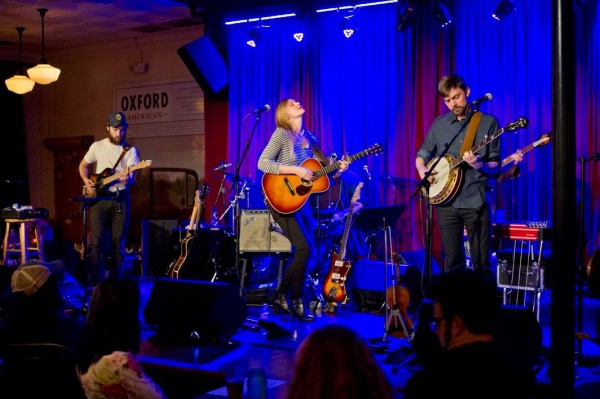Take a listen to the songs that inspired me and give me ‘Back To Cast Iron’ vibes. Check out the playlist here.




 “Nora Jane Struthers & the Party Line ripped through a set of well-crafted originals, as well as classics by George Jones and the Everly Brothers. Goofy and cheerful onstage…” Editors of the Oxford American, OXFORD AMERICAN
“Nora Jane Struthers & the Party Line ripped through a set of well-crafted originals, as well as classics by George Jones and the Everly Brothers. Goofy and cheerful onstage…” Editors of the Oxford American, OXFORD AMERICAN
Here is a link to some photos from the show.
The most exciting perk of working for a literary magazine with its own restaurant and performance space is—no surprise here—experiencing all the talent that streams through our doors. In the last year we’ve seen: Israeli jazz clarinetist, Anat Cohen; Nashville’s Lera Lynn (you may recognize her from the David Lynch–style barroom scenes in the most recent season of True Detective); Mississippi blues veteran, Leo Bud Welch; and some of Georgia’s finest songwriters—Patterson Hood and the Indigo Girls. Last night was no exception. Nora Jane Struthers & the Party Line ripped through a set of well-crafted originals, as well as classics by George Jones and the Everly Brothers. Goofy and cheerful onstage, Struthers led the group with an acoustic guitar and powerful vocals. We were particularly impressed by the fiddle solos of Joe Overton (who, we learned, will marry Struthers in May). Most surprising to us, though, was a moment mid-set when Struthers stepped aside to let her lead guitarist, Josh Vana (of Keezletown, Virginia), and Overton carry the audience through a literary interlude. Several years ago, this magazine published a profile of Dave Evans, a bluegrass legend who has, since his prime, drifted into poverty and obscurity. The author, Lee Johnson, is a friend of the band, and as an honor to him and to Evans, Josh and Joe read the story’s first section aloud. Evans’s tale isn’t notable in the grand scheme of the genre, in which talented musicians flow in and out of fame within a generation. But there’s a particular edge of tragedy at work in Evans’s life, the kind that, when paired with the undeniable scope of his talent, inspires cult followings and evangelical admiration. Johnson explores this in the piece, and we saw a bit of it last night after the reading; Overton and Struthers unplugged their instruments for their next song, a duet in honor of Evans, who was famous for having the bravado and energy to play acoustic-only sets before large audiences. You can read the story here.
Some twenty-one years ago, when we worked at a different magazine, we had occasion to publish a nonfiction piece by a young novelist named David Foster Wallace. When we met him in person and mentioned our admiration for his first novel, The Broom of the System, he winced as if in pain at what he clearly thought of as inferior work. He told us he was finishing another novel and offered to send excerpts that we might like to publish as well. The sections that arrived were wildly ambitious, linguistically inflammatory, minutely detailed, and hilariously funny, concerning, of all things, a junior tennis player. The magazine didn’t publish any of those chapters of Infinite Jest but Wallace invited us to the book’s New York release party, twenty years ago on Sunday, and as he did so, we detected another wince over the phone. He’d told us he literally lived in a cornfield in Illinois and was uncomfortable with New York scenes like the hot ticket this had become. At the party, we found him sitting in a semi-private back room (of what was normally an East Village dance club), and he clearly was not in his element. He later wrote to thank us for coming to his “Boschian” party and vowed never to go to another. The work was always paramount for him, and he often seemed prouder of the hard work he put in than in the end product. Twenty years after the book’s publication and that party (and seven and half years after his suicide), writers are weighing in on his masterpiece, reckoning with its heft and scope. Two of our favorite pieces are by Tom Bissell in the New York Times Book Review and by Emma-Lee Moss in the Guradian. Just a few years ago, we donated our and Wallace’s correspondence and materials—as family and many of his colleagues and other editors have—to the Harry Ransom Center at the University of Texas at Austin. The center’s blog has a recent post about its holdings.
As you relax at home this weekend escaping the unnervingly balmy February we’re having (down South at least), we urge you to reserve a quiet window of time to sit with Kevin Young’s new poem, “Money Road,” a meditation on Emmett Till, which appears in this week’s New Yorker. On the page, the poem’s compact, three-line stanzas belie the thunderous power of Young’s images and the propulsive narrative: a winter road trip through rural Mississippi. “Money Road” is named for the stretch of state highway that’s home to dilapidation of Bryant’s Store, where the Till tragedy was set into motion, or as Young writes: the place Emmett Till last whistled or smiled or did nothing. The poem is packed with grim and resonating observations, as in this declaration: the Delta Death’s second cousin once removed. It is snowing faintly and the wispy flakes are a recurring motif, A quiet snow globe of pain I want to shake. After reading the poem on its own, double-back and listen to the recording of Young, who recites the lines in a calm and powerful staccato, adding depth in his treatment of words “tidy drinks,” “cussed,” and “cold” in the poem’s final section. The poem is dedicated to John T. Edge. We imagine the two OA contributors riding together down Money Road, trying to reckon with a brutal history and keep warm.
Check out Nora Jane’s interview and feature on Amy Poehler’s Smart Girls!
“Nora Jane is entirely and unequivocally herself, and wants to encourage you to do the same, ‘…spend time doing whatever it is that makes you feel like there are sparks bouncing around your sternum,’ she says. In other words, pull a “Struthers”, follow your heart, and never look back.”
“Nora Jane Struthers is guided by fire. … Struthers has poured more and more emotion into her songwriting, coming up with some of the most quietly powerful narratives within the new wave of Americana artists.”
NPR’s Ken Tucker, Pop Music Critic for Fresh Air with Terry Gross, reviewed Wake on Fresh Air’s March 4, 2015 show, praising the album’s “rock ‘n’ roll force and forthrightness,” calling ‘Wake‘ an “awakening about who [Nora Jane] is, what she wants to do, and how she wants to sound” and saying she lives up to being named after Nora Charles and Jane Austen.
Among the highlights is an examination of “Let Go,” which Ken Tucker calls “an anthem of self-definition” and says is “about the roles women play throughout their lives to fulfill certain expectations [with] Struthers pushing back… you wouldn’t expect anything less from a rock ‘n’ roller.” In his post-broadcast Tweet, Fresh Air’s Ken Tucker called the album “excellent, alert, and sharp-tongued.”
“Nora Jane’s best [album] to date. . .. Struthers’ third record is brimming and bursting with life, with lessons learned and love discovered. With its immediately comforting blend of ’90s alt country, roadhouse blues, rootsy power pop, and straightforward honky-tonk, the album sounds, at various points, like early Neko Case, the Jayhawks, and, most strikingly, Kathleen Edwards. . .. She’s crafted a carefully considered 11-song sequence that presents one of the most unabashedly celebratory suites of songs about being newly in love (“When I Wake,” “Mistake,” “Lovin’ You”) in recent memory, only to spend most of side-two in a state of hungover reckoning (“The Wire,” “Let Go.”), interrogating the easy, conclusive joy of fresh romance.
“Nora Jane is entirely and unequivocally herself, and wants to encourage you to do the same, “…spend time doing whatever it is that makes you feel like there are sparks bouncing around your sternum,’ she says. In other words, pull a “Struthers”, follow your heart, and never look back.”
“Wake” [is] a collection of songs that adds more momentum to her profile as a rising star on the Americana scene.
(Reviewing “Let Go”) — “The song, a roots-y anthem of empowerment, explores the reasons behind the choices women make throughout their lives — standing up taller to fit in with the boys, listening to the “right” kinds of music, etc. — while ultimately recognizing it’s all bullshit and the real power comes from shrugging off those expectations. With any luck, this cut will kick the tired bro-country genre a step closer to its grave.”
(Reviewing “Wake”) — Struthers has undergone one of the more fascinating transformations in contemporary roots music. [Struthers is a] fiercely intelligent, put-together, independent woman .. ..”
“With their Americana and bluegrass roots and several songs (dare I say) worthy of top 40 country airplay, my prediction is that this may be the breakout band of 2015. If Nora Jane Struthers & the Party Line is coming to your town, I suggest you catch them, because the party has indeed started.”
“[Wake] brings to full fruition what her preceding record hinted at, a move from the acoustic-bluegrassy mix where she started to a more electric, diverse, aggressive brand of music. The change suits her well.”
(Stephen L. Betts, Reviewing “Let Go”) — “Just as her intensely energetic live performances connect audiences to the intricate tales woven through her lyrics, the ever-widening scope of Nora Jane Struthers’ musicality means that placing a neat, easy label on the genre she best represents is virtually impossible. … Whether the musical background is steeped in old-time folk or bluegrass, as much of her previous work have been, or, like Wake, boasts a more evolved blend of roots and rock with plenty of fiddle and steel guitar, Struthers’ lyrical vulnerability is matched by her growing confidence as a performer.”
“Wake, the upcoming new album from Nora Jane Struthers, is a confident collection of songs that shows the singer and songwriter putting a modern spin on traditional Americana sounds.”
“…the lyrical vulnerability comes straight from Struthers’ profound musical well, which has only gotten deeper in the two years since Carnival.”
“Falling in love is as good a reason as any other to let loose creatively, and it seems to have freed Struthers to put more of herself, and more of a wide-open heart’s feelings, into her latest collection of strong roots- and country-rock songs.“